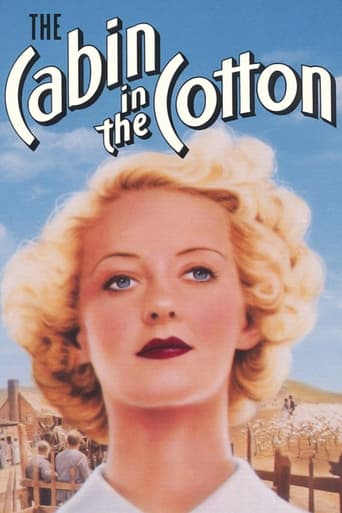Michael_Elliott
The Cabin in the Cotton (1932) *** (out of 4) Set in the South, this melodrama from Warner deals with the rich plant owners who continue to get everything they want while the poor "tenants" continue to grow poorer and not being able to feed their children. Marvin Blake (Richard Barthelmess) grew up as one of the poor kids but after getting an education thanks to land owner Norwood (Berton Churchill) he's put in the middle of the two sides. THE CABIN IN THE COTTON isn't a complete success but the cast is so good and the direction by Michael Curtiz is so on the mark that you can't help but be entertained. The biggest thing going for the film are the performances with Barthelmess leading the way in his part as the man caught in the middle. I thought the actor did a very good job at being torn by the two sides and you really believe everything that his character is going through. Dorothy Jordan is good as the poor girl who loves him and Bette Davis is grand as the Southern Belle who's also after him. Davis is incredibly beautiful here and she fits the role perfectly and especially the now famous line dealing with her refusing to kiss because she's just washed her hair. Churchill is also very effective in his role as is David Landau, Tully Marshall and Henry B. Walthall. The biggest problem with the film is that it's quite predictable from start to finish. Also, there's a prologue saying that the producers aren't taking sides in the matter and that they're presenting this film "as is" it is in life. Well, I think having all the poor people being whites was a bit unfair and I do think this takes away from the film. Still, fans of the stars will still want to check this out.
kidboots
Can it really be Bette Davis - earlier the same year she was a very mousey, nothing special "girl" in "Hell's House". Now blonded, sparkling and vivacious - Bette Davis has sex appeal.Even though it's main claim to fame is sultry Bette Davis and her "legendary" line "I'd like to kiss ya but I just washed ma hair" - this film is much more.It was one of Warner Brother's "social" dramas, focusing on the clashes between the wealthy planters and the sharecroppers (called peckerwoods). Richard Barthelmass plays Marvin Blake, a share cropper's son who aspires to higher things. Dorothy Peterson plays his mother. When his father dies from over work, Norwood, the planter (Berton Churchill) encourages Marvin to stay at school and later on gives him a job looking after the plantation accounts. The honesty and purity of Marvin's personality keep him in limbo. He feels he doesn't belong to any group. He wants his people to accept him but they are suspicious of his involvement with Norwood. Dorothy Jordan, a popular ingénue in the early 30s, plays Betty, the sharecropper girl who always believes in him. He, in turn, feels loyalty for Madge because he thinks she loves him but he is just a plaything for her.Although not as hard hitting as other Warner's social dramas, it improved in the last half - with an impassioned speech by veteran silent actor Henry B. Walthall as an old sharecropper trying to explain to Marvin what they are fighting for. In the court case at the end of the film Marvin gives an emotional speech about the planters and share croppers working together. Clarence Muse makes a few notable appearances as a blind singer.
moonspinner55
It's the Planters vs. the Tenants (but the producers object to taking sides!). Hilariously hoary drama from First National Pictures involves a studious young man, son of Southern cotton-pickers, who graduates from school and takes a job as bookkeeper to a surly land-owner who wants to know who's been stealing his cotton. The boss's firebrand daughter is played by a very young, very blond Bette Davis, easily slipping into Southern Belle mode while pulling some real zingers out of the musty script ("I'd love to kiss ya, but I just washed mah hair...'bye!"). The leading role is played by former silent-screen star Richard Barthelmess, who hasn't adjusted his acting techniques to this improved movie-medium and looks woefully stiff (with a pasty, silent-era make-up job). Dorothy Jordan is the poor girl he loves--she's pretty lively, but this is really Davis' show. ** from ****
gcking
With all the emphasis on Bette Davis in this film, it is easy to overlook the musical interest. I counted four different musical groups, each assigned to a different "class". There was the marching band at the funeral (black used at a poor white event), the jug band (white, at the poor white party), the jazz band (black, at the rich white party), and the blues singer. This is a surprisingly rich array of styles.Interestingly, only the blues singer (Clarence Muse) is credited.
